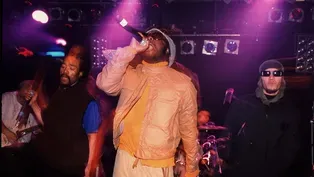
After Hurricane Katrina Hit, Hip Hop Stars Stepped Up
Clip: Episode 4 | 2m 40sVideo has Closed Captions
Hip Hop artists step up to aid victims of Hurricane Katrina.
Hip Hop community stands up for Hurricane Katrina victims, many of whom feel abandoned by their government following a lackluster response to the crisis. Lil Wayne recounts personal experience of losing his family in the storm (in archive). Chuck D and Killer Mike also describe watching the catastrophe unfold. Also featuring Dr. Kaye Whitehead and Hip Hop journalist journalist Rodney Carmichael.
Problems with Closed Captions? Closed Captioning Feedback
Problems with Closed Captions? Closed Captioning Feedback

After Hurricane Katrina Hit, Hip Hop Stars Stepped Up
Clip: Episode 4 | 2m 40sVideo has Closed Captions
Hip Hop community stands up for Hurricane Katrina victims, many of whom feel abandoned by their government following a lackluster response to the crisis. Lil Wayne recounts personal experience of losing his family in the storm (in archive). Chuck D and Killer Mike also describe watching the catastrophe unfold. Also featuring Dr. Kaye Whitehead and Hip Hop journalist journalist Rodney Carmichael.
Problems with Closed Captions? Closed Captioning Feedback
How to Watch Fight the Power: How Hip Hop Changed the World
Fight the Power: How Hip Hop Changed the World is available to stream on pbs.org and the free PBS App, available on iPhone, Apple TV, Android TV, Android smartphones, Amazon Fire TV, Amazon Fire Tablet, Roku, Samsung Smart TV, and Vizio.

Chuck D, Lorrie Boula and Yemi Bamiro
PBS spoke with Executive Producers Chuck D and Lorrie Boula, and Series Director Yemi Bamiro, about the evolution of Hip Hop, its influence on popular culture, the next generation, and more.Providing Support for PBS.org
Learn Moreabout PBS online sponsorship(somber music) - When Katrina hit, it was personal.
It was personal 'cause I knew people from down there.
Great friend of mine, her and her mom, Ms. Tillman's house was wiped out.
The United States of America and the world saw people in New Orleans stuck on the roofs of their houses, crying for help.
(somber music) - The president's job is to reassure the citizens.
To make us feel that things are under control, that there's someone in charge.
He did not do that.
- [Reporter] Coming back from a western trip, Air Force One flew President Bush low over New Orleans for a firsthand look at the devastation.
(somber music) - That tragedy showed me government gave not one damn about us.
Government did not care to save the people who were poor and on the ground in a way that they deserved.
- The song you're singing at the Grammys is about Katrina, right?
- Mm-hmm.
- In that song, you write, "I knew some people who were in that pool," right?
Are you still angry about it?
- Angry isn't the word.
(crowd chanting) - When there was a space for leaders to move in, hip hop artists moved in and took over that space.
(uplifting music) - Artists like Diddy and Jay-Z getting together and donating a million dollars, or all of the New Orleans artists.
- David Banner organized an amazing, an amazing concert in Atlanta, simply to get the money to send to victims of Hurricane Katrina, and we were in one of the biggest stadiums in the country.
Hip hop gave exactly what they had: themselves.
They gave their talent for the bigger purpose.
(pensive music)
Video has Closed Captions
Preview: Ep4 | 30s | From successful artists to changing history, follow the global evolution of Hip Hop. (30s)
Providing Support for PBS.org
Learn Moreabout PBS online sponsorshipSupport for PBS provided by:












